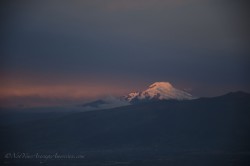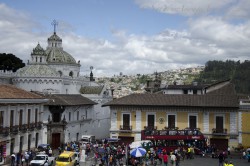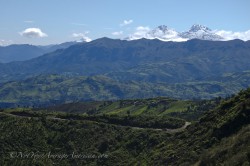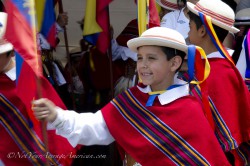- Home » Expat Articles » Interviews » US Expat Living in Ecuador - Interview with Angie
US Expat Living in Ecuador - Interview with Angie
| Published: | 28 Jun at 9 AM |
Want to get involved?
Become a Featured Expat and take our interview.
Become a Local Expert and contribute articles.
Get in touch today!
Become a Local Expert and contribute articles.
Get in touch today!
Filed: Interviews,Ecuador
As a military wife who has lived in many overseas locations, Angie has been told again and again that she isn't your average American. And thus, the title of a blog was born. Her less than average life, a military brat until her father retired and a military wife once she married, has given her a unique outlook on living abroad. She has recently brought that vision to Quito, Ecuador where she travels widely, eats broadly, photographs prolifically and brings it all together in through her prose and pictures at NotYourAverageAmerican.com. Angie's expat blog is called Not Your Average American (see listing here)
Where are you originally from?
The short answer is California.
The long answer is more complicated. I was born into military life at Rantoul AFB, Illinois. I have roots in both England and Wisconsin. My father retired in California and that's where I graduated from high school and met my husband. So California has become the default answer!
If you want to read more, I've actually written about it in "So, Where's Home?" http://notyouraverageamerican.com/2013/04/16/so-wheres-home/
In which country and city are you living now?
We live in Quito, Ecuador.
How long have you lived in Ecuador and how long are you planning to stay?
We've been here since August 2013 and we'll stay as long as my husband's job allows, at least a couple of years.
Why did you move to Ecuador and what do you do?
My husband works at the American Embassy. I am a stay-at-home mom and homeschool our one teen that is still at home. Our other son is in college in the US. Because my sons are older, I have plenty of time to explore the culture of Quito and the surrounding area. I've taken the opportunity to polish my prose and to step my photography up a notch.
Did you bring family with you?
Yes, we brought our 15 year old son with us.
How did you find the transition to living in a foreign country?
South America is unique in many ways and adapting to cultural differences takes patience. Going out to dinner was strange when we first arrived. The restaurants were surprisingly empty in the evenings. We learned that Quiteños are more likely to go out for lunch. When we lived in Buenos Aires, we learned that dinner didn't start until after 10pm. Here, most restaurants are closing down. That striking difference has taught us never to make assumptions. We don't always succeed, but we try!
The most difficult transition of this latest move still takes place every time we return to Quito from even a short trip away - the altitude. We're living at almost 10,000 ft. And while you might think that eventually we would become adjusted all we need is to leave for sea level for a day or two and then return to know that our bodies will never really like living so high.
Was it easy making friends and meeting people; do you mainly socialise with other expats?
Because my husband is here with the US Embassy, we found an immediate support network. And his job means that we interact a lot with local nationals. I volunteer at a local hospital and try to meet with Spanish-speaking friends on a regular basis. I'm afraid my Spanish would suffer otherwise.
We did try to meet local ex-pats when we very first arrived. We took a wrong turn on our way to the event and ended up on a one-way road out of town. The return route was closed for the commute. Needless to say, we didn't make it on time. Now that we're more aware of the local traffic conditions, we should try again!
What are the best things to do in the area; anything to recommend to future expats?
Quito is one of the most under-rated cities in South America. Most Americans only pass through on their way to the Galapagos and have no clue as to the wide variety of tourist opportunities in the area. It's part of why I am so passionate about writing my blog. And it isn't just the historic downtown or the excellent museums. I want folks to learn about the turquoise waters of the crater in Quilatoa and the hummingbirds at the Yanacocha Reserve. Even locals don't know about the hiking opportunities just outside Cotopaxi National Park or the variety of birds to be seen at Jerusalem Regional Park. And I know that my family has only just scratched the surface. We have so much to explore.
What do you enjoy most about living in Ecuador?
The people. Ecuadorians are extremely polite and considerate. If I ask a chef how he makes his special hot sauce, Ecuadorian ají, he shares it with me. If we have a problem and ask how to fix it, someone has the solution. My Ecuadorian friends are always quick to explain local customs when I ask and seem thrilled that I am interested at all. They don't always have the answers but they sure do try hard to find them.
How does the cost of living in Ecuador compare to home?
Our last "home" was Washington DC. Renting a house costs about the same but we have more space here in Quito than we did in Glover Park. Food is cheaper unless you're eating at restaurants marketed to American or European tourists. Then it depends. Some are reasonably priced and others cost as much eating in the States. If you eat at the places where the locals eat, like Cafe Libro in the Mariscal, you can eat lunch that includes freshly squeezed juice, soup, a main dish (usually chicken or beef), two to three vegetable salads, and a dessert for $5. The food is wonderful but options might be limited.
What negatives, if any, are there to living in Ecuador?
Probably the altitude, as I mentioned before. I also wouldn't enjoy living here without a car. Many places you just can't visit without a vehicle, especially the private reserves. Public transportation exists but it is heavily used and always crowded. The new metro is due to open in 2 years and I hope that will help relieve congestion on the public transport system. If you're here to visit, you can definitely make due with a combination of local taxis (call a service or have your hotel or hostal recommend a driver, especially at night) and buses.
If you could pick one piece of advice to anyone moving to Ecuador, what would it be?
Learn the language. Although you can make do without speaking Spanish, it makes life so much easier and so much richer.
Not everyone in Ecuador speaks Spanish. In many of the outlying regions, indigenous languages still are the main method of communication. But almost everyone has some level of Spanish. Even with a strong gringo accent, Spanish will get you much further at the end of the day. And locals really appreciate it.
What has been the hardest aspect to your expat experience so far?
This time, it's missing my oldest son. It's the first time we've lived apart. He was more than ready but I'm not sure moms are ever ready to say goodbye.
When you finally return home, how do you think you'll cope with repatriation?
Culture shock. It's happened to us before. We live in a foreign country, immerse ourselves as much as possible and learn to do without so many of the little things that when we return, it can be overwhelming. I hate that there is a Home Depot on every corner but love that I'm able to go to the hardware store and find exactly what I need! Repatriation is full of moments like that - love and hate at the same time.
What are your top 5 expat tips for anyone following in your footsteps?
As a military wife who has moved 4 times in the last four years, it has been next to impossible to hold down a job. I could be working here but have decided I would rather spend my time documenting our experience, exploring Quito and the beauty that surrounds it. My hope is that my writing and my photography will lead to employment, be it as a travel writer or as a self-published author. And thus, my blog! It's a great place to show case my work. And it has the added benefit of letting others know what to expect when they arrive.
How can you be contacted for further advice to future expats coming to your area?
The best way to contact me is via email at angelajean4progress at gmail dot com. But I also respond to comments on the blog at NotYourAverageAmerican.com and on Facebook, https://www.facebook.com/NotYourAverageAmerican?ref=hl
Here's the interview with Angie...
Where are you originally from?
The short answer is California.
The long answer is more complicated. I was born into military life at Rantoul AFB, Illinois. I have roots in both England and Wisconsin. My father retired in California and that's where I graduated from high school and met my husband. So California has become the default answer!
If you want to read more, I've actually written about it in "So, Where's Home?" http://notyouraverageamerican.com/2013/04/16/so-wheres-home/
In which country and city are you living now?
We live in Quito, Ecuador.
How long have you lived in Ecuador and how long are you planning to stay?
We've been here since August 2013 and we'll stay as long as my husband's job allows, at least a couple of years.
Why did you move to Ecuador and what do you do?
My husband works at the American Embassy. I am a stay-at-home mom and homeschool our one teen that is still at home. Our other son is in college in the US. Because my sons are older, I have plenty of time to explore the culture of Quito and the surrounding area. I've taken the opportunity to polish my prose and to step my photography up a notch.
Did you bring family with you?
Yes, we brought our 15 year old son with us.
How did you find the transition to living in a foreign country?
South America is unique in many ways and adapting to cultural differences takes patience. Going out to dinner was strange when we first arrived. The restaurants were surprisingly empty in the evenings. We learned that Quiteños are more likely to go out for lunch. When we lived in Buenos Aires, we learned that dinner didn't start until after 10pm. Here, most restaurants are closing down. That striking difference has taught us never to make assumptions. We don't always succeed, but we try!
The most difficult transition of this latest move still takes place every time we return to Quito from even a short trip away - the altitude. We're living at almost 10,000 ft. And while you might think that eventually we would become adjusted all we need is to leave for sea level for a day or two and then return to know that our bodies will never really like living so high.
Was it easy making friends and meeting people; do you mainly socialise with other expats?
Because my husband is here with the US Embassy, we found an immediate support network. And his job means that we interact a lot with local nationals. I volunteer at a local hospital and try to meet with Spanish-speaking friends on a regular basis. I'm afraid my Spanish would suffer otherwise.
We did try to meet local ex-pats when we very first arrived. We took a wrong turn on our way to the event and ended up on a one-way road out of town. The return route was closed for the commute. Needless to say, we didn't make it on time. Now that we're more aware of the local traffic conditions, we should try again!
What are the best things to do in the area; anything to recommend to future expats?
Quito is one of the most under-rated cities in South America. Most Americans only pass through on their way to the Galapagos and have no clue as to the wide variety of tourist opportunities in the area. It's part of why I am so passionate about writing my blog. And it isn't just the historic downtown or the excellent museums. I want folks to learn about the turquoise waters of the crater in Quilatoa and the hummingbirds at the Yanacocha Reserve. Even locals don't know about the hiking opportunities just outside Cotopaxi National Park or the variety of birds to be seen at Jerusalem Regional Park. And I know that my family has only just scratched the surface. We have so much to explore.
What do you enjoy most about living in Ecuador?
The people. Ecuadorians are extremely polite and considerate. If I ask a chef how he makes his special hot sauce, Ecuadorian ají, he shares it with me. If we have a problem and ask how to fix it, someone has the solution. My Ecuadorian friends are always quick to explain local customs when I ask and seem thrilled that I am interested at all. They don't always have the answers but they sure do try hard to find them.
How does the cost of living in Ecuador compare to home?
Our last "home" was Washington DC. Renting a house costs about the same but we have more space here in Quito than we did in Glover Park. Food is cheaper unless you're eating at restaurants marketed to American or European tourists. Then it depends. Some are reasonably priced and others cost as much eating in the States. If you eat at the places where the locals eat, like Cafe Libro in the Mariscal, you can eat lunch that includes freshly squeezed juice, soup, a main dish (usually chicken or beef), two to three vegetable salads, and a dessert for $5. The food is wonderful but options might be limited.
What negatives, if any, are there to living in Ecuador?
Probably the altitude, as I mentioned before. I also wouldn't enjoy living here without a car. Many places you just can't visit without a vehicle, especially the private reserves. Public transportation exists but it is heavily used and always crowded. The new metro is due to open in 2 years and I hope that will help relieve congestion on the public transport system. If you're here to visit, you can definitely make due with a combination of local taxis (call a service or have your hotel or hostal recommend a driver, especially at night) and buses.
If you could pick one piece of advice to anyone moving to Ecuador, what would it be?
Learn the language. Although you can make do without speaking Spanish, it makes life so much easier and so much richer.
Not everyone in Ecuador speaks Spanish. In many of the outlying regions, indigenous languages still are the main method of communication. But almost everyone has some level of Spanish. Even with a strong gringo accent, Spanish will get you much further at the end of the day. And locals really appreciate it.
What has been the hardest aspect to your expat experience so far?
This time, it's missing my oldest son. It's the first time we've lived apart. He was more than ready but I'm not sure moms are ever ready to say goodbye.
When you finally return home, how do you think you'll cope with repatriation?
Culture shock. It's happened to us before. We live in a foreign country, immerse ourselves as much as possible and learn to do without so many of the little things that when we return, it can be overwhelming. I hate that there is a Home Depot on every corner but love that I'm able to go to the hardware store and find exactly what I need! Repatriation is full of moments like that - love and hate at the same time.
What are your top 5 expat tips for anyone following in your footsteps?
- Be open-minded.
- Don't judge.
- Learn enough of the language to at least be polite.
- Learn more of the language to better know the people and culture around you.
- Share your experience with others.
As a military wife who has moved 4 times in the last four years, it has been next to impossible to hold down a job. I could be working here but have decided I would rather spend my time documenting our experience, exploring Quito and the beauty that surrounds it. My hope is that my writing and my photography will lead to employment, be it as a travel writer or as a self-published author. And thus, my blog! It's a great place to show case my work. And it has the added benefit of letting others know what to expect when they arrive.
How can you be contacted for further advice to future expats coming to your area?
The best way to contact me is via email at angelajean4progress at gmail dot com. But I also respond to comments on the blog at NotYourAverageAmerican.com and on Facebook, https://www.facebook.com/NotYourAverageAmerican?ref=hl
Grab a featured expat badge that links to this interview!
 Copy and paste code to display the Featured Expat Badge:
Copy and paste code to display the Featured Expat Badge:Comments » There are 2 comments

Jen wrote 11
years ago:
Great, interesting interview. Completely concur with her tips for any American expat. We've been stationed in several overseas locations and found openmindedness to be key!

Stephanie wrote 11
years ago:
It is fascinating to read about the amazing places and diverse cultures around our world. Reading Angie's blog gives me the opportunity to take an adventure through my computer, from the comfort of my home! Her photographs of wildlife, people, and landscapes make the experience even more real and exciting!





 Angie is an American expat living in Ecuador. Blog description: This blog depends on the classic combination of casual but well written prose and excellent photography. The majority of posts are about Quito and nearby trips with a sprinkling of other areas of Ecuador. Birds are definitely highlighted!
Angie is an American expat living in Ecuador. Blog description: This blog depends on the classic combination of casual but well written prose and excellent photography. The majority of posts are about Quito and nearby trips with a sprinkling of other areas of Ecuador. Birds are definitely highlighted!





